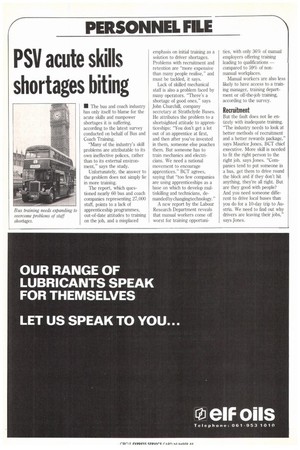PSV acute skills shortages biting
Page 68

If you've noticed an error in this article please click here to report it so we can fix it.
• The bus and coach industry has only itself to blame for the acute skills and manpower shortages it is suffering, according to the latest survey conducted on behalf of Bus and Coach Training.
"Many of the industry's skill problems are attributable to its own ineffective polices, rather than to its external environment," says the study.
Unfortunately, the answer to the problem does not simply lie in more training.
The report, which questioned nearly 60 bus and coach companies representing 27,000 staff, points to a lack of apprenticeship programmes, out-of-date attitudes to training on the job, and a misplaced emphasis on initial training as a solution to driver shortages. Problems with recruitment and retention are "more expensive than many people realise," and must be tackled, it says.
Lack of skilled mechanical staff is also a problem faced by many operators. "There's a shortage of good ones," says John Churchill, company secretary at Strathclyde Buses. He attributes the problem to a shortsighted attitude to apprenticeships: "You don't get a lot out of an apprentice at first, and then after you've invested in them, someone else poaches them. But someone has to train mechanics and electricians. We need a national movement to encourage apprentices." BCT agrees, saying that "too few companies are using apprenticeships as a base on which to develop multiskilling and technicians, demanded by changingtechnology. "
A new report by the Labour Research Department reveals that manual workers come off worst for training opportuni ties, with only 36% of manual employers offering training leading to qualifications — compared to 59% of nonmanual workplaces.
Manual workers are also less likely to have access to a training manager, training department or off-the-job training, according to the survey.
Recruitment
But the fault does not lie entirely with inadequate training. "The industry needs to look at better methods of recruitment and a better rewards package," says Maurice Jones, BCT chief executive. More skill is needed to fit the right person to the right job, says Jones. "Companies tend to put someone in a bus, get them to drive round the block and if they don't hit anything, they're all right. But are they good with people? And you need someone different to drive local buses than you do for a 10-day trip to Austria. We need to find out why drivers are leaving their jobs," says Jones.














































































































